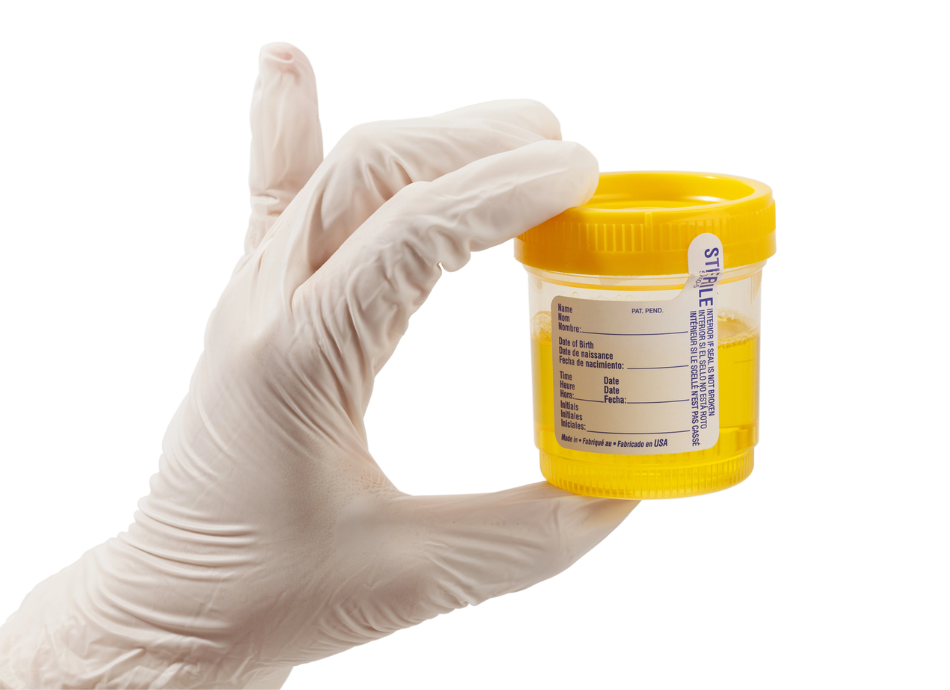If you're a frequent visitor to Healthify, why not share our site with a friend? Don't forget you can also browse Healthify without using your phone data.
Urine testing
Key points about urine testing
- A urine (pee) sample can be used to check your general health.
- It can also be tested to detect certain conditions, such as kidney or liver disease and urinary tract infections (UTIs), or to monitor an existing medical condition.
- A urine sample is often tested first by your healthcare provider using a test strip and, if necessary, it may be sent to a lab for further analysis.

Urine testing is done to check for certain conditions such as kidney or liver disease and urinary tract infections. It involves a process called urinalysis, which is a set of tests done on your urine. This is a common and simple investigation that can be done for several reasons:
- As part of a routine medical exam, pre-surgery preparation, a pregnancy check up, or overall health check up.
- To diagnose a medical condition if you're experiencing symptoms such as:
- abdominal (tummy) pain
- back pain
- peeing often
- having pain when you pee
- having blood in your pee, or
- if you notice changes in the colour, smell or consistency (eg, cloudy, foamy or thick) of your pee.
- To monitor a medical condition and measure the effectiveness of treatment, such as for kidney disease or a urinary tract infection (UTI).
Other tests, such as pregnancy testing and drug screenings, may also need a urine sample, but these tests look for substances that aren't included in a typical urinalysis. For example, urine testing in pregnancy detects hormones produced during pregnancy, in drug screening it's done to detect specific drugs, and in male sexual health checks to detect chlamydia and gonorrhoea.
Common types of urine sample you may be asked to provide include a midstream urine test and a 24-hour urine test.
Midstream urine test
A midstream urine test is the most common urine test and is used when the lab needs to grow bacteria to look for urinary infections. In this test, you have to collect a fresh sample of urine from the middle part of your urine flow (not the start or the end) into a clean container for testing. Read more about how to collect a midstream urine sample correctly(external link).
24-hour urine testing
Sometimes a 24-hour urine test is done, eg, to help find out whether you have kidney disease or to see how well your kidney disease is being managed. For this test, all the urine you produce in a 24-hour period is collected into a container provided by your healthcare provider. This is then sent to the lab for analysis. The collection centre will tell you how this needs to be done.
There are several steps involved in analysing urine.
- Visual examination: Looking at the colour, clarity (cloudy or clear) and concentration of your urine provides some information about possible conditions that can cause your symptoms.
- Chemical examination: This uses urine dipsticks, which are small strips of paper with squares that change colour depending on whether there are things such as glucose, ketones, protein, red blood cells or signs of infection in your urine. The presence of a high level of glucose in your urine may indicate you have diabetes. However, urine tests are no longer used for diabetes screening or diagnosis, a blood test is needed for that.
- Microscopic examination: Your urine is looked at under a microscope to look at the numbers and types of cells, and also to look for casts (tube-like structures that can form in your kidneys and get into your urine), crystals, bacteria, mucus and cancer cells.
- Culture: If you're not responding to treatment or are experiencing ongoing symptoms, healthcare providers may send your urine sample to a lab to check for bacteria and see if you're on the right treatment.
All of these steps provide some information about your health. Steps 1 to 3 make up a urinalysis. Steps 1 and 2 are often done in your doctor or nurse's office when you come in with symptoms of possible urine infection, kidney problems or as part of a routine check-up. Your urine sample may be sent to a lab for microscopic examination and culture if you fail to improve with treatment, or if there are positive dipstick results without a clear cause.

Image credit: Canva
A urinalysis by itself doesn’t usually provide a definite diagnosis. Depending on why the test was done, abnormal results may or may not need to be followed up. Your healthcare provider will consider the results along with the results of any other tests to work out what should happen next.
If you’re otherwise healthy and don’t have any signs or symptoms of illness, urinalysis results that are slightly abnormal may not be a cause for concern and follow-up may not be needed. However, if you've been diagnosed with a kidney or urinary tract condition, abnormal urinalysis results may indicate a need to change your treatment plan.
For more information about what your urinalysis results mean, talk to your healthcare provider.
Urine tests(external link) Awanui Labs, NZ
Brochures
What your kidneys do(external link) HealthEd, NZ available in English/te reo Māori(external link)
Mid-stream urine collection(external link) Awanui Labs, NZ
Apps
References
- Urinalysis (UA test)(external link) Testing, US, 2022
- Urine dipstick test(external link) Patient Info, UK
- Glucose in urine test(external link) MedlinePlus, US, 2022
- Urinalysis(external link) Mayo Clinic, US, 2023
Urine dipstick analysis(external link) Patient Info, UK
Video Urinalysis – OSCE guide(external link) and written guide(external link) Geeky Medics, UK, updated 2023
OSCE checklist – Urinalysis(external link) Geeky Medics, UK
Credits: Healthify editorial team. Healthify is brought to you by Health Navigator Charitable Trust.
Reviewed by: Tracey Xu, Nurse Practitioner, Emergency Department, Hutt Hospital, Wellington
Last reviewed:





